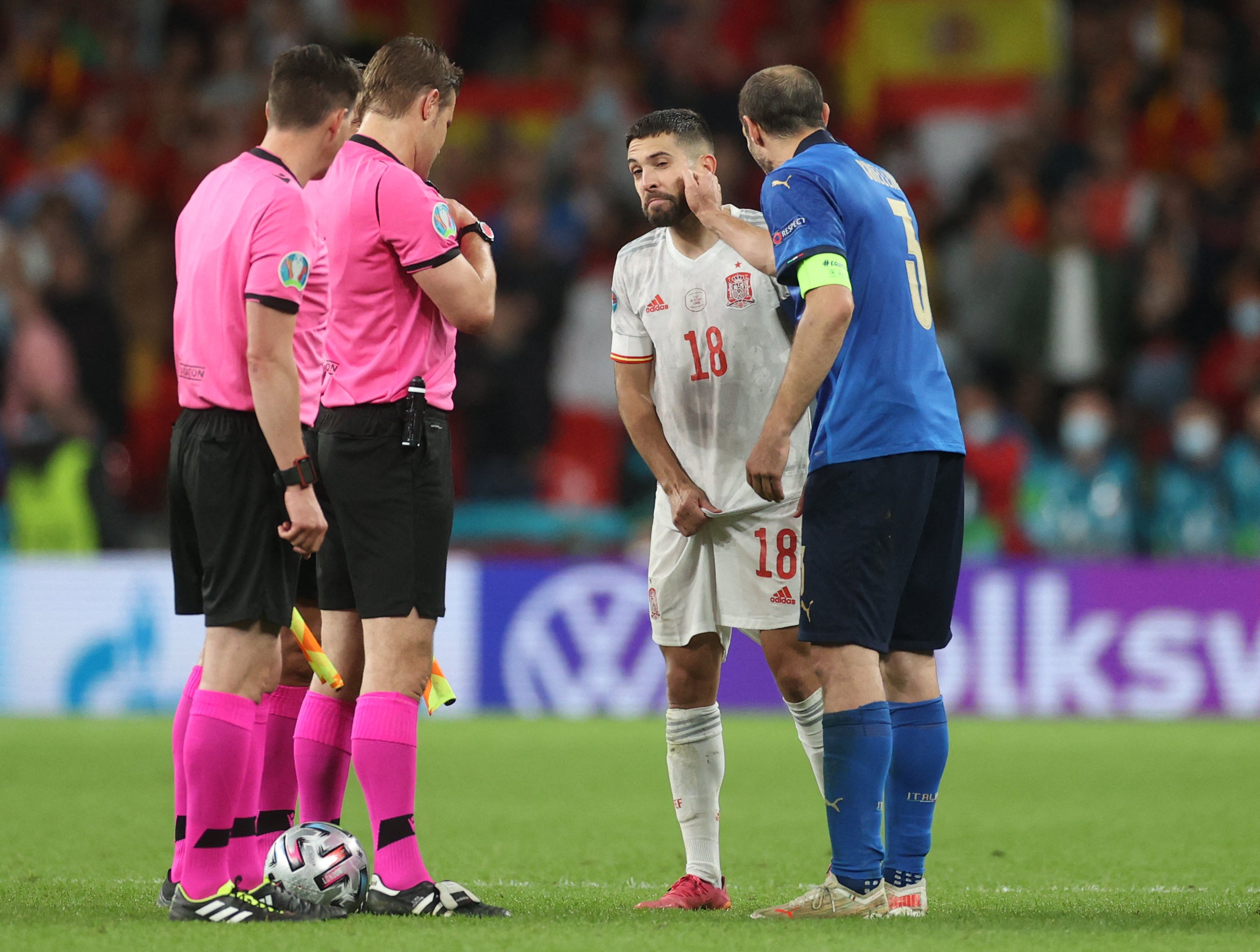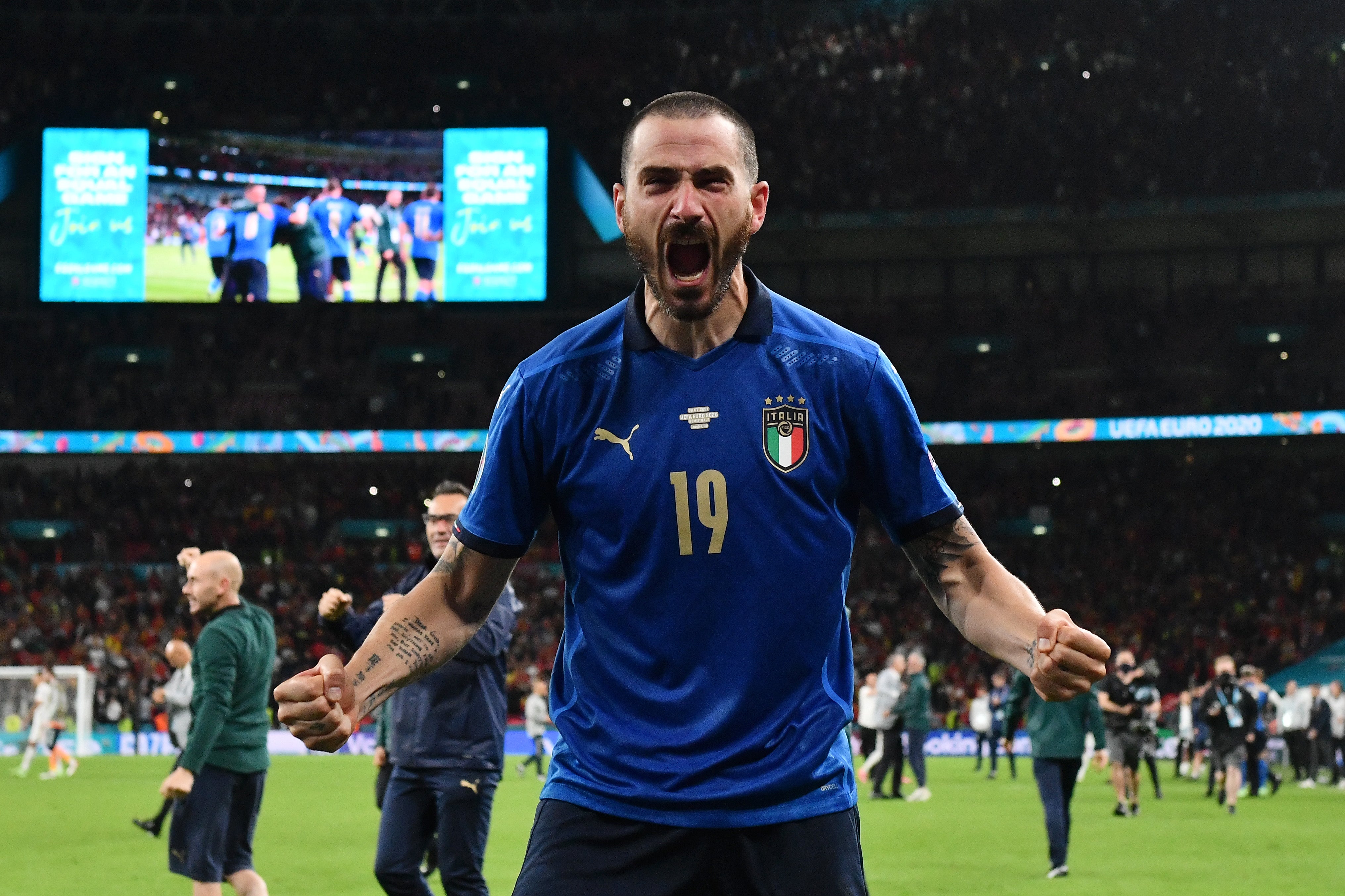
The tone for Euro 2020 was set in the opening game. With Italy leading 3-0 against Turkey in stoppage time, Giorgio Chiellini produced a last-gasp challenge that helped preserve the clean sheet. He rose from the ground, punched the air and celebrated with his teammates.
The soul of the Italian game was laid bare. The joy of defending is an integral part of their history. Italy is referred to as “the boot” because of its shape. The motif works for football, too: Azzurri defenders like to stick lo stivale in. Hard. Nowhere else is the craft of defending so relished and perfected.
Chiellini and Leonardo Bonucci – who have both captained Italy this summer – have been two of the stars of the tournament. Their combination of experience – Bonucci is 34 and his partner two years older – intelligence and cynicism have made them compulsive viewing. England’s young, vibrant attack will have to overcome these ageing warriors at Wembley on Sunday if Harry Kane is to hoist the Henri Delaunay Trophy.
Kane is often lauded as “streetwise”. The Italian centre-backs have been round the block so many times, they make the England captain look innocent. If the 27-year-old can manipulate Bonucci and Chiellini then he will indeed be a top operator. After all, Luis Suarez, the demonic prince of the dark arts, became so frustrated with Chiellini in the 2014 World Cup that the Uruguay striker bit the Italian and was subsequently banned for four months. Chiellini later said: “I admire his malice.”
Chiellini’s magnificent malevolence was on show before the penalty shootout in the semi-final against Spain on Tuesday. He bullied Jordi Alba at the coin toss for ends, conducting the physical and mental intimidation with a manic smile on his face. The Italy captain was beyond pretence. He was the alpha male, his was the alpha team.

Jose Mourinho recognised kindred spirits when Juventus beat his Manchester United team 1-0 three years ago. “Mr Bonucci and Mr Chiellini could give some Harvard University classes about how to be a central defender,” the arch cynic said. The Portuguese manager was right, but to learn about defending there is no need to go further than Italy.
The wisest players know this. When Jamie Carragher decided he wanted to improve his game after moving to centre-back in the early part of his career, he sought out DVDs of Franco Baresi, the anchor of the great Milan side of the late 1980s.
At the start, Baresi was less artist than artisan. He worked on his game and the technique of defending until he became a virtuoso. Like many Italian stoppers, he sculpted brilliance out of seemingly unpromising raw material. Bonucci and Chiellini are in that tradition – in some other countries their potential might have been overlooked in the search for stylish, ball-playing centre-backs. Italy’s heritage means that they do things differently.
The peak of Italian defensive play came in the early 1960s when Helenio Herrera’s Internazionale dominated world football. Grande Inter won three Scudettos, back-to-back European Cups and two consecutive Intercontinental Cups using the catenaccio – “bolt lock” – system that deployed four man-markers and a sweeper.
By 1966, when England won the World Cup, catenaccio was largely finished as a tactic. Franz Beckenbauer, stepping out from the backline with the ball for West Germany, was a sensation, and the stirrings of Total Football were beginning. Tight marking became difficult when opponents interchanged positions. The Italian fixation with defending did not go away, though.
The roll call of greatness carried on through the decades. Claudio Gentile, Gaetano Scirea and Giuseppe Bergomi from the World Cup-winning side of 1982 were uncompromising and masterful. Alessandro Costacurta and Paolo Maldini, who lined up alongside Baresi, are spoken about in awe. Fabio Cannavaro, who captained the 2006 World Cup winners, and Alessandro Nesta, who was injured in the group stage and missed the final in Germany, combined elegance and pragmatism. Bonucci and Chiellini are the latest names in this outstanding lineage.

Roberto Mancini’s side are on a 33-game unbeaten run and have conceded just three times in the tournament. They rely on a high press and start defending in the opposition’s half. Yet the central defenders give the midfielders and full-backs freedom to play higher up the pitch. They are the cornerstone of the team. The England forwards will know they have been in a battle after the final.
The sheer exuberance of Italy’s defending transmits itself through the side and to their opponents. In a tournament where top-class midfielders have been in short supply and the emphasis has been on forwards, Bonucci and Chiellini have stood out. They have shown great guile, some brute force, no little skill and have spiced up the spectacle with the odd dash of gamesmanship.
The Azzurri plan to finish the tournament as they started: celebrating clean sheets and glorying in mean-eyed, they-shall-not-pass brilliance.







